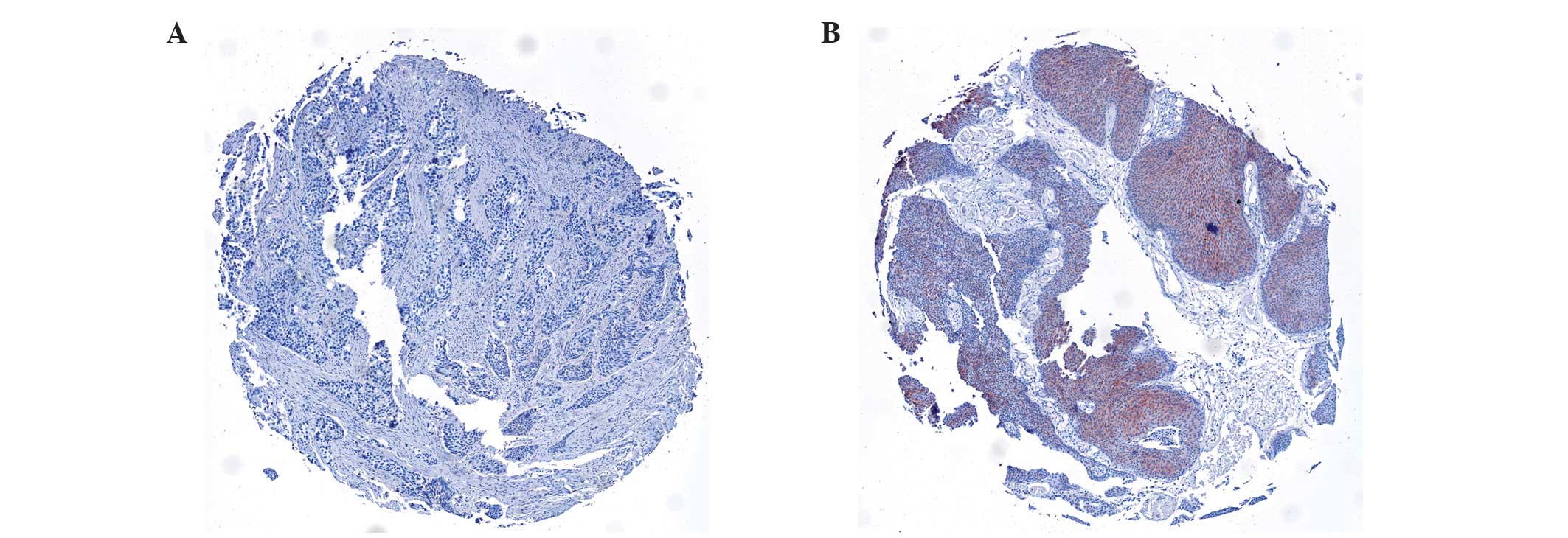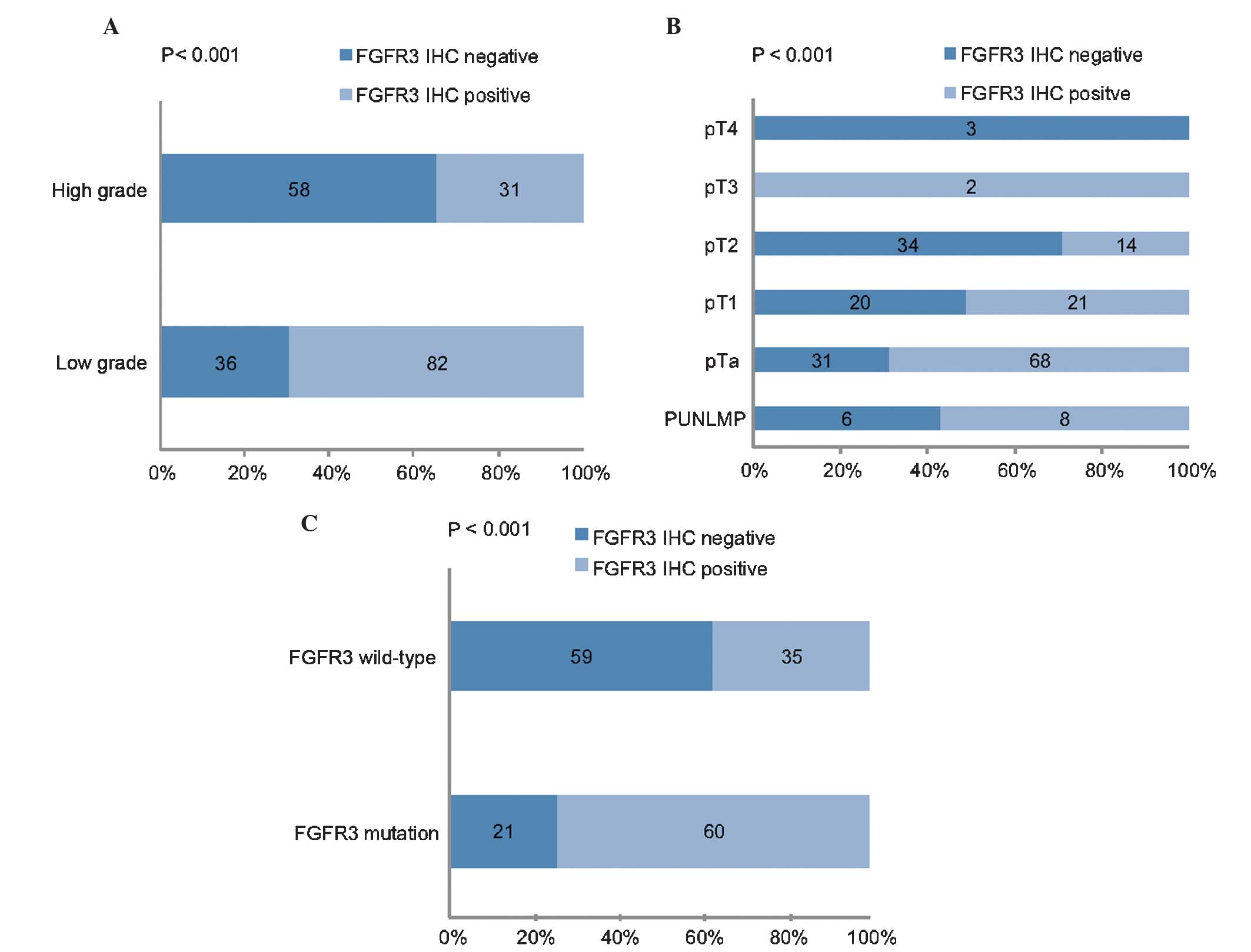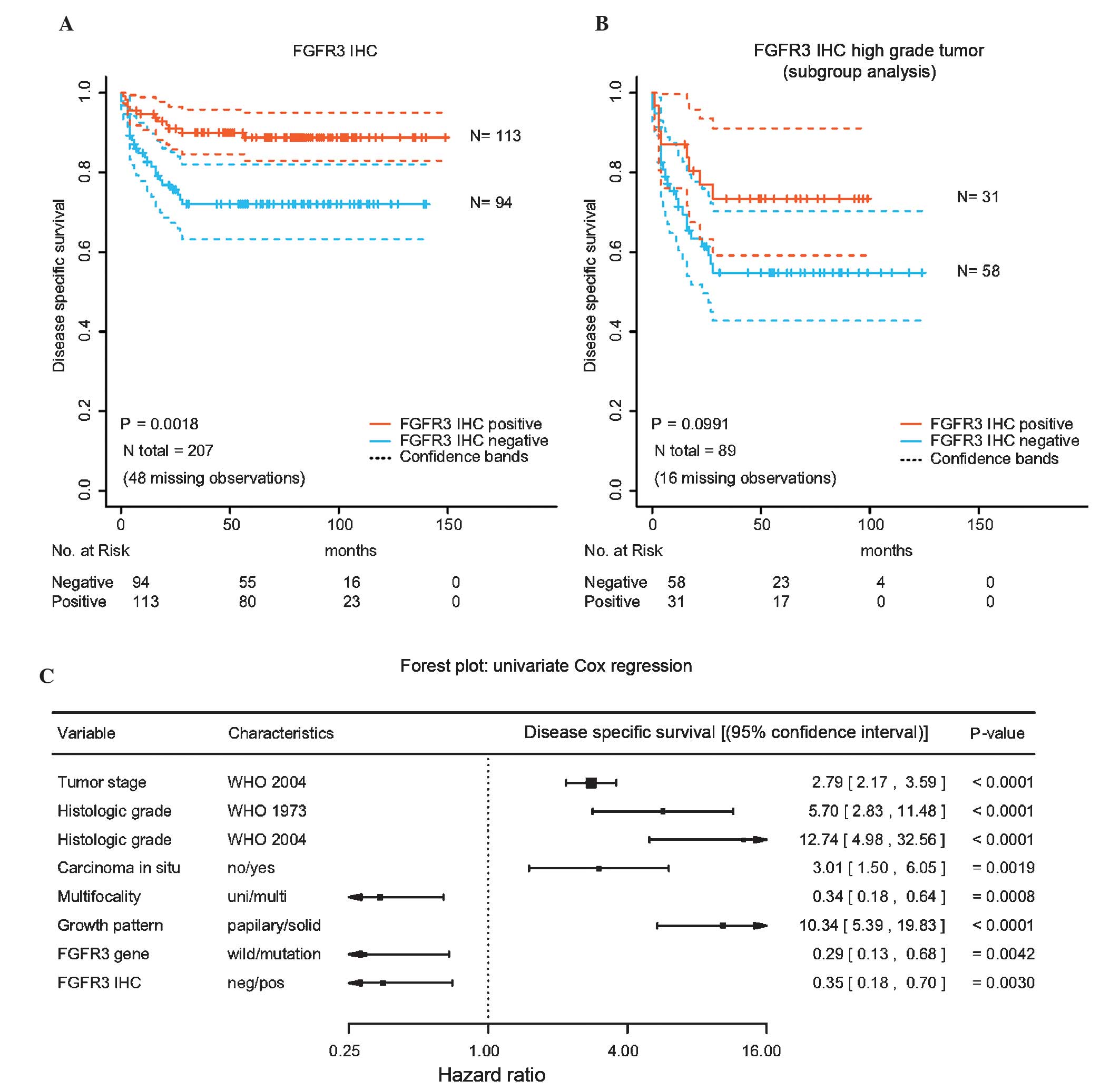|
1
|
Heney NM: Natural history of superficial
bladder cancer. Prognostic features and long-term disease course.
Urol Clin North Am. 19:429–433. 1992.PubMed/NCBI
|
|
2
|
Hall MC, Chang SS, Dalbagni G, Pruthi RS,
Seigne JD, Skinner EC, Wolf JS Jr and Schellhammer PF: Guideline
for the management of nonmuscle invasive bladder cancer (stages Ta,
T1, and Tis): 2007 update. J Urol. 178:2314–2330. 2007. View Article : Google Scholar : PubMed/NCBI
|
|
3
|
Eble J, Sauter G, Epstein JI and
Sesterhenn IA: World Health Organization Classification of Tumours.
Pathology and Genetics of Tumours of the Urinary System and Male
Genital Organs. IARC Press. (Lyon). 2004.
|
|
4
|
Wu XR: Urothelial tumorigenesis: A tale of
divergent pathways. Nat Rev Cancer. 5:713–725. 2005. View Article : Google Scholar : PubMed/NCBI
|
|
5
|
Burger M, van der Aa MN, van Oers JM,
Brinkmann A, van der Kwast TH, Steyerberg EC, Stoehr R, Kirkels WJ,
Denzinger S, Wild PJ, et al: Prediction of progression of
non-muscle-invasive bladder cancer by WHO 1973 and 2004 grading and
by FGFR3 mutation status: A prospective study. Eur Urol.
54:835–843. 2008. View Article : Google Scholar : PubMed/NCBI
|
|
6
|
Turner N and Grose R: Fibroblast growth
factor signalling: From development to cancer. Nat Rev Cancer.
10:116–129. 2010. View
Article : Google Scholar : PubMed/NCBI
|
|
7
|
Dieci MVI, Arnedos M, Andre F and Soria
JC: Fibroblast growth factor receptor inhibitors as a cancer
treatment: From a biologic rationale to medical perspectives.
Cancer Discov. 3:264–279. 2013. View Article : Google Scholar : PubMed/NCBI
|
|
8
|
Cappellen D, De Oliveira C, Ricol D, de
Medina S, Bourdin J, Sastre-Garau X, Chopin D, Thiery JP and
Radvanyi F: Frequent activating mutations of FGFR3 in human bladder
and cervix carcinomas. Nat Genet. 23:18–20. 1999. View Article : Google Scholar : PubMed/NCBI
|
|
9
|
Billerey C, Chopin D, Aubriot-Lorton MH,
Ricol D, de Medina S Gil Diez, Van Rhijn B, Bralet MP,
Lefrere-Belda MA, Lahaye JB, Abbou CC, et al: Frequent FGFR3
mutations in papillary non-invasive bladder (pTa) tumors. Am J
Pathol. 158:1955–1959. 2001. View Article : Google Scholar : PubMed/NCBI
|
|
10
|
van Rhijn BW, Montironi R, Zwarthoff EC,
Jöbsis AC and van der Kwast TH: Frequent FGFR3 mutations in
urothelial papilloma. J Pathol. 198:245–251. 2002. View Article : Google Scholar : PubMed/NCBI
|
|
11
|
van Rhijn BW, Vis AN, van der Kwast TH,
Kirkels WJ, Radvanyi F, Ooms EC, Chopin DK, Boevé ER, Jöbsis AC and
Zwarthoff EC: Molecular grading of urothelial cell carcinoma with
fibroblast growth factor receptor 3 and MIB-1 is superior to
pathologic grade for the prediction of clinical outcome. J Clin
Oncol. 21:1912–1921. 2003. View Article : Google Scholar : PubMed/NCBI
|
|
12
|
van Oers JM, Wild PJ, Burger M, Denzinger
S, Stoehr R, Rosskopf E, Hofstaedter F, Steyerberg EW,
Klinkhammer-Schalke M, Zwarthoff EC, et al: FGFR3 mutations and a
normal CK20 staining pattern define low-grade noninvasive
urothelial bladder tumours. Eur Urol. 52:760–768. 2007. View Article : Google Scholar : PubMed/NCBI
|
|
13
|
Hernández S, López-Knowles E, Lloreta J,
Kogevinas M, Jaramillo R, Amorós A, Tardón A, García-Closas R,
Serra C, Carrato A, et al: FGFR3 and Tp53 mutations in T1G3
transitional bladder carcinomas: Independent distribution and lack
of association with prognosis. Clin Cancer Res. 11:5444–5450. 2005.
View Article : Google Scholar : PubMed/NCBI
|
|
14
|
Zieger K, Dyrskjøt L, Wiuf C, Jensen JL,
Anderson CL, Jensen KM and Ørntoft TF: Role of activating
fibroblast growth factor receptor 3 mutations in the development of
bladder tumors. Clin Cancer Res. 11:7709–7719. 2005. View Article : Google Scholar : PubMed/NCBI
|
|
15
|
van Rhijn BW, van der Kwast TH, Liu L,
Fleshner NE, Bostrom PJ, Vis AN, Alkhateeb SS, Bangma CH, Jewett
MA, Zwarthoff EC, et al: The FGFR3 mutation is related to favorable
pT1 bladder cancer. J Urol. 187:310–314. 2012.PubMed/NCBI
|
|
16
|
van Rhijn BW, van der Kwast TH, Vis AN,
Kirkels WJ, Boevé ER, Jöbsis AC and Zwarthoff EC: FGFR3 and P53
characterize alternative genetic pathways in the pathogenesis of
urothelial cell carcinoma. Cancer Res. 64:1911–1914. 2004.
View Article : Google Scholar : PubMed/NCBI
|
|
17
|
Bakkar AA, Wallerand H, Radvanyi F, Lahaye
JB, Pissard S, Lecerf L, Kouyoumdjian JC, Abbou CC, Pairon JC,
Jaurand MC, et al: FGFR3 and TP53 gene mutations define two
distinct pathways in urothelial cell carcinoma of the bladder.
Cancer Res. 63:8108–8112. 2003.PubMed/NCBI
|
|
18
|
Tomlinson DC, Baldo O, Harnden P and
Knowles MA: FGFR3 protein expression and its relationship to
mutation status and prognostic variables in bladder cancer. J
Pathol. 213:91–98. 2007. View Article : Google Scholar : PubMed/NCBI
|
|
19
|
Mhawech-Fauceglia P, Cheney RT, Fischer G,
Beck A and Herrmann FR: FGFR3 and p53 protein expressions in
patients with pTa and pT1 urothelial bladder cancer. Eur J Surg
Oncol. 32:231–237. 2006. View Article : Google Scholar : PubMed/NCBI
|
|
20
|
Maeng YH, Eun SY and Huh JS: Expression of
fibroblast growth factor receptor 3 in the recurrence of
non-muscle-invasive urothelial carcinoma of the bladder. Korean J
Urol. 51:94–100. 2010. View Article : Google Scholar : PubMed/NCBI
|
|
21
|
Gudjónsson S, Bendahl PO, Chebil G,
Höglund M, Lindgren D, Lundberg LM, Lövgren K, Fernö M, Månsson W
and Liedberg F: Can tissue microarray-based analysis of protein
expression predict recurrence of stage Ta bladder cancer? Scand J
Urol Nephrol. 45:270–277. 2011. View Article : Google Scholar : PubMed/NCBI
|
|
22
|
di Martino E, Tomlinson DC and Knowles MA:
A decade of FGF receptor research in bladder cancer: Past, present,
and future challenges. Adv Urol. 2012:4292132012. View Article : Google Scholar : PubMed/NCBI
|
|
23
|
Gómez-Román JJ, Saenz P, Molina M,
González J Cuevas, Escuredo K, Cruz S Santa, Junquera C, Simón L,
Martínez A, Baños JL Gutiérrez, et al: Fibroblast growth factor
receptor 3 is overexpressed in urinary tract carcinomas and
modulates the neoplastic cell growth. Clin Cancer Res. 11(2 Pt 1):
459–465. 2005.PubMed/NCBI
|
|
24
|
Poyet C, Jentsch B, Hermanns T,
Schweckendiek D, Seifert HH, Schmidtpeter≈ M, Sulser T, Moch H,
Wild PJ and Kristiansen G: Expression of histone deacetylases 1, 2
and 3 in urothelial bladder cancer. BMC Clin Pathol. 14:102014.
View Article : Google Scholar : PubMed/NCBI
|
|
25
|
Matsumoto M, Ohtsuki Y, Ochii K, Seike Y,
Iseda N, Sasaki T, Okada Y, Kurabayashi A and Furihata M:
Fibroblast growth factor receptor 3 protein expression in
urothelial carcinoma of the urinary bladder, exhibiting no
association with low-grade and/or non-invasive lesions. Oncol Rep.
12:967–971. 2004.PubMed/NCBI
|
|
26
|
Bernard-Pierrot I, Brams A, Dunois-Lardé
C, Caillault A, de Medina SG Diez, Cappellen D, Graff G, Thiery JP,
Chopin D, Ricol D and Radranyi F: Oncogenic properties of the
mutated forms of fibroblast growth factor receptor 3b.
Carcinogenesis. 27:740–747. 2006. View Article : Google Scholar : PubMed/NCBI
|
|
27
|
Lopez-Beltran A, Luque RJ,
Alvarez-Kindelan J, Quintero A, Merlo F, Requena MJ and Montironi
R: Prognostic factors in survival of patients with stage Ta and T1
bladder urothelial tumors: The role of G1-S modulators (p53,
p21Waf1, p27Kip1, cyclin D1, and cyclin D3), proliferation index,
and clinicopathologic parameters. Am J Clin Pathol. 122:444–452.
2004. View Article : Google Scholar : PubMed/NCBI
|
|
28
|
Hernández S, López-Knowles E, Lloreta J,
Kogevinas M, Amorós A, Tardón A, Carrato A, Serra C, Malats N and
Real FX: Prospective study of FGFR3 mutations as a prognostic
factor in nonmuscle invasive urothelial bladder carcinomas. J Clin
Oncol. 24:3664–3671. 2006. View Article : Google Scholar : PubMed/NCBI
|
|
29
|
Barbisan F, Santinelli A, Mazzucchelli R,
Lopez-Beltran A, Cheng L, Scarpelli M, van der Kwast T and
Montironi R: Strong immunohistochemical expression of fibroblast
growth factor receptor 3, superficial staining pattern of
cytokeratin 20, and low proliferative activity define those
papillary urothelial neoplasms of low malignant potential that do
not recur. Cancer. 112:636–644. 2008. View Article : Google Scholar : PubMed/NCBI
|
|
30
|
van Rhijn BW: Combining molecular and
pathologic data to prognosticate non-muscle-invasive bladder
cancer. Urol Oncol. 30:518–523. 2012. View Article : Google Scholar : PubMed/NCBI
|
|
31
|
Bodoor K, Ghabkari A, Jaradat Z, Alkhateeb
A, Jaradat S, Al-Ghazo MA, Matalka I, Musleh H and Haddad Y: FGFR3
mutational status and protein expression in patients with bladder
cancer in a Jordanian population. Cancer Epidemiol. 34:724–732.
2010. View Article : Google Scholar : PubMed/NCBI
|
|
32
|
Guancial EA, Werner L, Bellmunt J, Bamias
A, Choueiri TK, Ross R, Schutz FA, Park RS, O'Brien RJ, Hirsch MS,
et al: FGFR3 expression in primary and metastatic urothelial
carcinoma of the bladder. Cancer Med. 3:835–844. 2014. View Article : Google Scholar : PubMed/NCBI
|
|
33
|
Turo R, Harnden P, Thygesen H, Fleischmann
A, Thalmann GN, Seiler R, Cross WR and Knowles MA: FGFR3 expression
in primary invasive bladder cancers and matched lymph node
metastases. J Urol. 193:325–330. 2015. View Article : Google Scholar : PubMed/NCBI
|

















